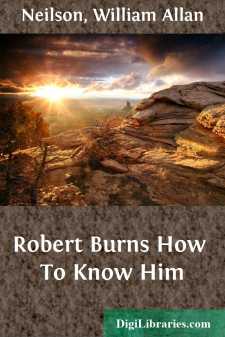Categories
- Antiques & Collectibles 13
- Architecture 36
- Art 48
- Bibles 22
- Biography & Autobiography 813
- Body, Mind & Spirit 142
- Business & Economics 28
- Children's Books 16
- Children's Fiction 13
- Computers 4
- Cooking 94
- Crafts & Hobbies 4
- Drama 346
- Education 46
- Family & Relationships 57
- Fiction 11829
- Games 19
- Gardening 17
- Health & Fitness 34
- History 1377
- House & Home 1
- Humor 147
- Juvenile Fiction 1873
- Juvenile Nonfiction 202
- Language Arts & Disciplines 88
- Law 16
- Literary Collections 686
- Literary Criticism 179
- Mathematics 13
- Medical 41
- Music 40
- Nature 179
- Non-Classifiable 1768
- Performing Arts 7
- Periodicals 1453
- Philosophy 64
- Photography 2
- Poetry 896
- Political Science 203
- Psychology 42
- Reference 154
- Religion 513
- Science 126
- Self-Help 84
- Social Science 81
- Sports & Recreation 34
- Study Aids 3
- Technology & Engineering 59
- Transportation 23
- Travel 463
- True Crime 29
Robert Burns How To Know Him
Categories:
Description:
Excerpt
CHAPTER I
BIOGRAPHY
“I have not the most distant pretence to what the pye-coated guardians of Escutcheons call a Gentleman. When at Edinburgh last winter, I got acquainted at the Herald's office; and looking thro' the granary of honors, I there found almost every name in the kingdom; but for me,
My ancient but ignoble blood
Has crept thro' scoundrels since the flood.
Gules, purpure, argent, etc., quite disowned me. My forefathers rented land of the famous, noble Keiths of Marshal, and had the honor to share their fate. I do not use the word ‘honor’ with any reference to political principles: loyal and disloyal I take to be merely relative terms in that ancient and formidable court known in this country by the name of ‘club-law.’ Those who dare welcome Ruin and shake hands with Infamy, for what they believe sincerely to be the cause of their God or their King, are—as Mark Antony in Shakspear says of Brutus and Cassius—‘honorable men.’ I mention this circumstance because it threw my Father on the world at large; where, after many years' wanderings and sojournings, he picked up a pretty large quantity of observation and experience, to which I am indebted for most of my pretensions to Wisdom. I have met with few who understood Men, their manners and their ways, equal to him; but stubborn, ungainly Integrity, and headlong, ungovernable Irascibility, are disqualifying circumstances; consequently, I was born, a very poor man's son.”
“You can now, Sir, form a pretty near guess of what sort of Wight he is, whom for some time you have honored with your correspondence. That Whim and Fancy, keen sensibility and riotous passions, may still make him zig-zag in his future path of life is very probable; but, come what will, I shall answer for him—the most determinate integrity and honor [shall ever characterise him]; and though his evil star should again blaze in his meridian with tenfold more direful influence, he may reluctantly tax friendship with pity, but no more.”
These two paragraphs form respectively the beginning and the end of a long autobiographical letter written by Robert Burns to Doctor John Moore, physician and novelist. At the time they were composed, the poet had just returned to his native county after the triumphant season in Edinburgh that formed the climax of his career. But no detailed knowledge of circumstances is necessary to rouse interest in a man who wrote like that. You may be offended by the self-consciousness and the swagger, or you may be charmed by the frankness and dash, but you can not remain indifferent. Burns had many moods besides those reflected in these sentences, but here we can see as vividly as in any of his poetry the fundamental characteristics of the man—sensitive, passionate, independent, and as proud as Lucifer—whose life and work are the subject of this volume.
1. Alloway, Mount Oliphant, and Lochlea
William Burnes, the father of the poet, came of a family of farmers and gardeners in the county of Kincardine, on the east coast of Scotland. At the age of twenty-seven, he left his native district for the south; and when Robert, his eldest child, was born on January 25, 1759, William was employed as gardener to the provost of Ayr. He had besides leased some seven acres of land, of which he planned to make a nursery and market-garden, in the neighboring parish of Alloway; and there near the Brig o' Doon built with his own hands the clay cottage now known to literary pilgrims as the birthplace of Burns. His wife, Agnes Brown, the daughter of an Ayrshire farmer, bore him, besides Robert, three sons and three daughters. In order to keep his sons at home instead of sending them out as farm-laborers, the elder Burnes rented in 1766 the farm of Mount Oliphant, and stocked it on borrowed money....



